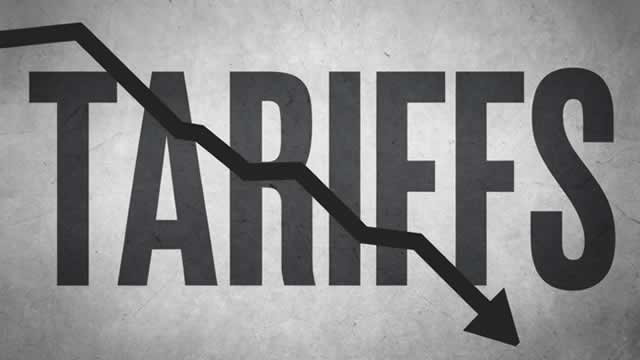Wall Street’s Dramatic Reversal: The Impact of Tariffs on the Global Economy
The financial world witnessed a significant turn of events on Thursday, as Wall Street’s main indexes plummeted following concerns over the potential negative impact of high tariffs on the global economy. This marked a sharp contrast from the previous session, where historic share gains were recorded after U.S. President Donald Trump announced plans to temporarily lower levies on some countries.
The Market’s Reaction
The Dow Jones Industrial Average (DJIA) dropped by approximately 800 points, or 3%, while the S&P 500 and the Nasdaq Composite Index both declined by around 2.7% and 3.3%, respectively. The tech-heavy Nasdaq Composite Index experienced its worst day since late 2018.
Tariffs: The Culprit
The primary reason behind this market volatility was the uncertainty surrounding the ongoing trade conflict between the United States and its major trading partners, particularly China. The renewed threat of increased tariffs has raised concerns among investors about the potential negative impact on corporate earnings and economic growth.
President Trump’s Announcement
Initially, investors were elated when President Trump announced plans to delay an increase in tariffs on some Chinese imports, as well as remove tariffs on certain goods from Brazil and Argentina. However, these gains were short-lived as concerns over the broader trade situation resurfaced.
The Global Economic Impact
The ongoing trade tensions between the world’s largest economies have already led to a slowdown in global economic growth, with the International Monetary Fund (IMF) revising its growth forecasts downward. The uncertainty surrounding the future of international trade has negatively affected business confidence and investment decisions.
Impact on Consumers
The situation also poses a threat to consumers, as higher tariffs could lead to increased prices for a variety of goods, from electronics to automobiles. This could result in a decrease in purchasing power and a potential reduction in overall consumer spending.
Impact on Industries
Certain industries, such as agriculture and manufacturing, have been particularly hard hit by the trade tensions. For instance, U.S. farmers have suffered from retaliatory tariffs imposed by China, leading to a significant decrease in exports and revenues.
- Agriculture: U.S. farmers have been negatively impacted by retaliatory tariffs, leading to a decrease in exports and revenues.
- Manufacturing: The ongoing trade conflict has led to increased costs for manufacturers, as well as uncertainty regarding future supply chains and demand.
- Technology: The tech sector has been impacted by both tariffs and supply chain disruptions, with some companies reporting lower earnings due to these factors.
Conclusion
The recent market volatility serves as a reminder of the ongoing uncertainty surrounding the global trade situation. The potential negative impact of tariffs on the global economy, as well as on individual industries and consumers, cannot be underestimated. As the situation continues to evolve, investors and businesses must remain vigilant and adapt to the changing landscape.
The future of international trade remains uncertain, and it is crucial for individuals and businesses to stay informed and prepared for potential changes. By remaining adaptable and agile, we can navigate the challenges posed by the global economic landscape and continue to thrive in a rapidly evolving world.





